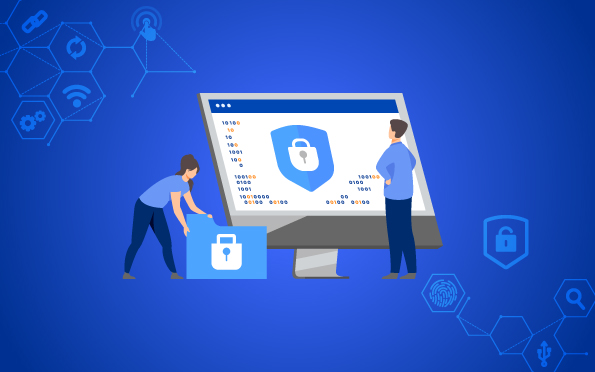Careers in cybersecurity: Becoming a guardian of the digital world

Can you guess what Yahoo, Uber, and Facebook have in common? Each of these companies has fallen prey to massive data breaches that cost them millions of dollars.
In such an age where even tech giants are not secure, cybersecurity jobs have become more prominent than ever. According to a PwC report, the cybersecurity market will see compound annual growth of 15.6% in India.
If you want to be a part of this rising workforce that fights cybercrime, then read on to find out how you can make a career in cybersecurity.
What are the types of careers in cybersecurity?
Cybersecurity professionals work in a spectrum of roles which can be primarily divided into the following areas:
1. Risk assessment
2. Security intelligence
3. Security architecture and engineering
4. Security operations
5. Governance and compliance
6. Security awareness (user education)
Entry-level cybersecurity careers
1. Information security analyst/ Cybersecurity analyst – They examine the security practices and protocols and check for any vulnerabilities in the client’s system, software, application, or network. This assessment is then documented and the findings are discussed with the stakeholders. They may also be responsible for educating the company employees about best security practices.
2. Ethical hackers – If you’ve been bitten by the hacking bug, then you can put it to good use by becoming an ethical hacker. One of the entry-level jobs in ethical hacking includes penetration testing wherein you try to break into a system as a black hat hacker would. This helps the company foresee any attacks and put security measures into place. In addition to finding out the weaknesses, an ethical hacker could suggest ways to make the system more secure.
To learn more about ethical hacking, read What is ethical hacking and Hacking: The common myths and careers.
You can also check out this webinar on career opportunities in ethical hacking.
3. Digital forensics analyst – They can be considered the detectives of the cybersecurity world. Their job involves investigating cybercrimes using different methods such as uncovering hidden data, retrieving data, and analysing digital evidence. This cybersecurity career path combines the disciplines of law and computer science. So you will be responsible for investigating cybercrimes like scams, trafficking, terrorist activities, etc.
4. Incident responder – As the name suggests, this job involves responding to a security incident or threat. Their job involves coming up with a protocol for emergency situations as well as executing it and suggesting ways to prevent similar cyber attacks. They may also help in a security audit.
 Job description of an incident responder
Job description of an incident responder
These were a few careers in cybersecurity for freshers. However, many cybersecurity professionals have also taken a non-traditional approach wherein they take up a role such as network administrator, system administrator, IT auditor, etc. These IT jobs help them gain foundational knowledge of networking and computer systems that is of tremendous help when applying for a job in cybersecurity.
Mid-level and high-level cybersecurity careers
5. Cybersecurity engineer – A cybersecurity engineer is primarily responsible for building a secure system. They do this by implementing solutions for vulnerabilities and possible threats. Besides this, they are responsible for monitoring the network and troubleshooting issues related to network and security.
6. Security architect – They are tasked with coming up with security structures and work closely with cybersecurity engineers to develop the solutions. To conceive these solutions, they need to be thoroughly aware of the organisation’s information system, security policies, and business goals. Since this is a management role, they are also responsible for recruiting and mentoring.
7. Cryptographer and cryptanalyst – Cryptographers are responsible for encrypting sensitive data which should not be copied, modified, or intercepted. For example, payment systems. They are also responsible for identifying the weaknesses in the existing encryption systems.
Cryptanalysts (like Alan Turing), on the other hand, decipher data during attacks.
Both cryptographers and cryptanalysts use data structures, algorithms, and statistical models for encryption or analysis.
8. Cybersecurity consultant – They are cybersecurity professionals who are hired by different clients to improve their security systems. This involves examining the existing structure, performing security audits, and advising and implementing security solutions.
9. Chief Information Security Officer (CISO) – Once you have acquired some years of experience, you can transition into this senior role in cybersecurity. It is a leadership role wherein you will manage everything from cybersecurity strategy to hiring and development. Their responsibilities span across a number of cybersecurity roles such as security analysis, cyber intelligence, incident reporting, forensics, physical security, etc. which is why it’s important to have an in-depth experience of the cybersecurity field in order to step into this critical role.
10. Chief privacy officer (CPO) – With growing concerns over data privacy, it has become imperative for organisations to tackle the subject and adhere to regulations. Many enterprises have started hiring chief privacy officers who are well-versed in data protection. Besides helping companies in complying with the official security standards of different states and countries, CPOs are responsible for designing policies and practices that ensure that sensitive information remains secure from breaches.
11. Malware analyst – Once a breach has been attempted or occurred, malware analysts play Miss Marple to understand everything about how it took place. This helps the cybersecurity team prepare for any future or ongoing attacks.
Malware analysts need to understand both the defensive and offensive sides of cybersecurity. Their analysis needs a knowledge of both programming and forensics.

Source: CyberSeek
To summarise, a cybersecurity professional is basically responsible to safeguard their company’s data and system. They can do this by being on Team Red which consist of offensive cybersecurity professionals like ethical hackers or being on Team Blue which include defensive cybersecurity experts like a security engineer.
What are the skills that you will need to make a career in cybersecurity?
Although cybersecurity skills will differ across each profile, here are the most common hard skills that you need when applying for a job in cybersecurity:
1. Basics of networking – A foundational knowledge of networking is a must as everything in the digital world is based on that. Networking helps you learn how computers interact with each other and how data gets transferred. You need to have an understanding of concepts like TCP and OSI models, proxy, firewall, etc.
2. System administration – This refers to the configuration and maintenance of computers including the software and hardware. So, if you have always been the go-to person to fix tech-related problems in your family or friend circle, then it might be time to put it into use!
3. Coding – While knowledge of programming languages is not required for all cybersecurity jobs, it can be helpful to have a knowledge of basic ones such as HTML. Another popular language that is easy to learn and is essential in numerous cybersecurity roles is Python. Some cybersecurity careers that require coding include ethical hacking, cybersecurity engineering, and malware analysis; the most common programming languages they need to know include C, C++, Perl, Java, and PHP.
4. Knowledge of operating systems – Mac, Linux, Windows – you gotta know them all! Know-how of the command line can also give you an edge.
Here the most common soft skills that cybersecurity professionals put into practice:
5. Communication – In the popular imagination, cybersecurity professionals are depicted as unsocial, tech enthusiasts in a hoodie who are coding away. However, a major part of their work that is often overlooked comprises communicating with stakeholders and documenting assessments. Sometimes you may be required to convey technical information in a digestible format, so good communication skills are essential.
6. Problem-solving – Tackling challenges is a key part of any cybersecurity job, so a love for problem-solving is important. You should be self-motivated to research small issues and try to solve them before seeking help.
7. Attention to detail – As a cybersecurity professional, you should be able to detect any unusual activity. This necessitates the ability to notice details.
8. Continuous learning – To stay one step ahead of cyber criminals, you need to stay abreast of the developments in the cybersecurity world.
How to start a career in cybersecurity?
1. Degree – Although not always mandatory, a bachelor’s degree in cybersecurity, computer science, or IT can certainly give you an advantage especially when you want to progress onto senior roles. In some cases, an MBA degree could also come in handy.
2. Training – If you are still testing the waters of cybersecurity, then you can start with a beginner-friendly training in cybersecurity.
Internshala’s Ethical hacking training has been created for anyone who wants to learn ethical hacking from scratch. Besides introducing you to theoretical concepts of networking, web applications, and coding, you will get hands-on practice by detecting vulnerabilities in an e-commerce website.
3. Certifications – A certificate in cybersecurity can help you specialise in particular spheres of cybersecurity. For example, Certified Cloud Security Professional (CCSP) can help you establish your credibility in handling cloud security. However, certifications can require a huge financial investment, so you should first focus on building your elementary knowledge and ascertain the cybersecurity role you want to make a career in.
4. Internships – Landing a cybersecurity job comes down to experience and internships can help you acquire the same. They provide you the opportunity to work with a mentor who has experience in the industry and can give you insights into the cybersecurity career path. Internships can also be useful for cybersecurity aspirants who have IT skills and want to transition into a cybersecurity role.
5. Bug bounty programs – Several companies reward security enthusiasts and researchers to detect vulnerabilities in their systems so that they can secure their systems better. These are called bug bounty programs; popular programs include those run by GitHub, Google, Zoom, Intel, and Microsoft. You can even participate in Internshala’s bug bounty program. Participating in these programs can help you enhance your knowledge as well as gain experience.
6. Continuous learning – This is a core part of a career in cybersecurity as the IT world is rapidly evolving. Besides searching and following resources yourself, you could look for job benefits like learning and development opportunities or tuition reimbursement.
Tips from cybersecurity recruiters and professionals:
1. When you are applying for your first job, you might be overwhelmed by the amount of experience asked. If the job description does not mention a degree as a mandatory requirement, then your education can count as experience.
2. Attend industry-related conferences and events as recruiters often attend them to build their talent pipeline.
3. Different companies have varying definitions of cybersecurity roles and responsibilities can often overlap. So, in addition to reading job titles, you could read the job descriptions to find out if you are the right fit.
This was an overview of making a career in cybersecurity. If you are intrigued by the domain of ethical hacking, then you can check out Internshala’s Ethical Hacking training. Use code BLOG10 to avail a discount of 10% and discover the enthralling world of cybersecurity!



